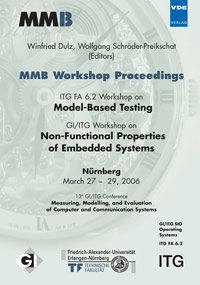A Review of Aspect-Oriented Software Development Techniques Used in Real-Time and Embedded Systems Software
Konferenz: MMB Workshop 2006 - ITG FA 6.2 Workshop on Model-Based Testing, GI/ITG Workshop on Non-Functional Properties of Embedded Systems, 13th GI/ITG Conference Measuring, Modelling, and Evaluation of Computer and Communication
27.03.2006 - 29.03.2006 in Nürnberg, Germany
Tagungsband: MMB Workshop 2006
Seiten: 12Sprache: EnglischTyp: PDF
Persönliche VDE-Mitglieder erhalten auf diesen Artikel 10% Rabatt
Autoren:
Cheng, Pericles Leng (Cyprus College, Department of Computer Science, Nicosia, Cyprus)
Cheng, Pericles Leng; Papadopoulos, George Angelos (University of Cyprus, Department of Computer Science, Nicosia, Cyprus)
Inhalt:
Timeliness and criticality of a process are the two main concerns when designing real-time systems. In addition to that embedded systems are bounded by limited resources. To achieve timeliness and conform to the criticality issues of various processes while at the same time using a minimal amount or resources, real-time embedded systems use different techniques such as task scheduling, resource management and task synchronization. All of these techniques involve a number of the modules of the system which makes the use of Aspect-Oriented Software Development imperative. AOSD is a programming technique which uses the notion of join points to capture specific locations in code execution and then use advices to insert new code. This paper examines existing work in the development of schedulers, resource allocation agents and synchronization techniques using Aspect-Oriented Software Development in real-time systems and more specifically in embedded systems. An analysis of the existing research is used to describe the advantages of using AOSD over conventional OOP methods and to identify areas where further research may be required.


